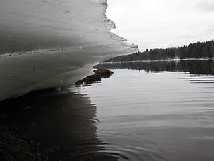Global Warming Threat: Permafrost Thawing Across Siberia And Alaska
Here’s a report on the Conference of Parties (COP) meetings that, this week and next, take on the challenges of bringing the nations of the world together to deal with climate change. The report, called “Global Warming Threat: Permafrost Thawing Across Siberia And Alaska Poses New Concern, UNEP” inspires me to ask readers: When you come across articles that project catastrophic effects of climate change in the year 2100, what do you think? How do you react emotionally?
Of course, there are people who simply don’t believe that there actually will be effects. Most of these “deniers” seem to live in the U.S., and their numbers as a percentage of the population are 20 – 30 times larger than the tiny percentage of scientists who hold these fringe views.
But let’s return to the vast majority of decently educated people with viewpoints that are informed by the scientific community whose life’s work is most closely associated with the matter. I put myself in this (extremely large) category. What shall we think of Earth, 2100?
Part of me just can’t come to terms with the concept of my own mortality, and the fact that, unless I live to be 145, I won’t be here to see what happens. To paraphrase one of my heroes, the late journalist Christopher Hitchens, I can’t stand the concept that I’m going to be leaving the party, and that it will go roaring on, full bore, even though I will have gone home to sleep.
Part of me is glad I won’t be here to suffer with what’s left of our civilization at the time. Such an experience would be bound to include pangs of self-loathing associated with, “I could have done more to prevent this, and I didn’t. I was too… (fill in the blank) lazy, complacent, afraid to raise my voice….”
I’d be interested in your viewpoint.


The methane hydrates have been the topic that give me the most pause in terms of sheer uncertainty. Their release is an almost classic ‘tipping point’ curve, and so if they get past the inflection, FUBAR won’t begin to describe the results. Latest National Geographic has a very nice article on the topic.
Your real question above is, I would opine, very interesting to students of psychology. I have run into quite a number of people in my life, that when posed with the hypothetical scenario of taking the world with them when they die, there exists an astoundingly large percentage that is quite comfortable with that. It used to be asked in the context of nuclear Armageddon studies, but would seem to be equally applicable to dramatic climate change outcomes.
In previous comments, I’ve opined that humans are immensely adaptable creatures, and will likely muddle along regardless of what we do to the planet. What enables this would seem to be not having any other experience to draw from. If you lived your entire life in a hole in the ground, you are likely to not have any extreme opinions about that. I most certainly would not survive as a time traveler into these various bleak scenarios because I know too much about what I previously had. It would be nearly impossible to mentally adapt.
The younger generation shall adapt by creating the changes necessary to thrive. Sure, more oil will be tapped, but energy is still needed to power the machines that we shall develop, machines capable of mass producing solar energy parts and batteries for pennies on the dollar.
Their problem will not be as much whether or not people believe that XSCO2 is bad, but whether or not machines will be made that sequester that XSCO2 from the very air into a safe depository (or rock like material). It will surely take even larger amounts of energy to do this AND keep up with civilization (even with the increased efficiencies of leds, better insulation, electric cars, etc).
Also, we must continue with environmental laws that encourage natural sequestration as well because we can only cover x amount of Earth with solar panels depending on a variety of parameters.
Solar panels must be of a light color because dark panels convert (a lot of) light into excess infrared (heat). And if 10 billion people are to live an American lifestyle, we would have to cover about 3% of the land with 15% efficient panels. Though, I believe that this excess heat is far more trivial than the excess CO2 from fossil fuels, it may still create undesirable outcomes. It is best to create the BEST kind of solar panel, which only has to be as dark as whatever its efficiency, to truly be able to say “solar can’t be bad at all”.
Of course, the American lifestyle can have reduced energy requirements and at the same time, offer a greater than minimalist reward. Better transportation techniques, passive solar house layout and even good old fashioned “We care about the biosphere” conservation! At this rate (and with more efficient panels) we shall only have about 1/2 million square miles of solar install jobs 🙂
It will still take years (possibly less than a year with concentrating optics) for solar to recoup on both financial and energy costs, and add to that, the costs of storage (which MUST also be made by machine for pennies on the dollar if we are to survive without molten fuels based nuclear such as LFTR). This requires a type of energy re-investing, such that only 4/5ths or so of any renewable energy could be used for, well, people and our industry. The remainder must be re-invested back into the process of building itself…
Kinda like a giant, exponentially growing reality… kinda like what paved roads and oil companies have already become today!